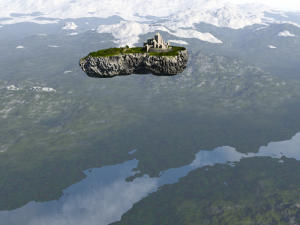Difference between revisions of "Skyness"
Trismegistus (talk | contribs) m |
Trismegistus (talk | contribs) m |
||
| Line 1: | Line 1: | ||
[[File:SkynessOverPytharnia.png|thumb|300px|A lesser Medibgóëse skyness over Pytharnia]] | [[File:SkynessOverPytharnia.png|thumb|300px|A lesser Medibgóëse skyness over Pytharnia]] | ||
| − | A [[skyborne]] island of earth formerly used as a residence by giants and presently by [[sky people]] and some [[dragonfolk]], a skyness is thought to be the product of [[antediluvian]] titancraft. The principle skynesses of the northern hemisphere are home to the nations of [[Medibgö]] and the [[Saikusahi]]. Other skynesses include [[Flampesha]] and [[Bambnaskügchawr]]. Smaller skynesses either following greater skynesses in close proximity or observe the orbit of a greater skyness, but in a location that is analogous to the Lagrangian point of planetary orbits. In the modern [[West]], there are no known natural skynesses outside of the Medibgóëse Skyness System. | + | A [[skyborne]] island of earth formerly used as a residence by giants and presently by [[sky people]] and some [[dragonfolk]], a skyness is thought to be the product of [[antediluvian]] titancraft. The principle skynesses of the northern hemisphere are home to the nations of [[Medibgö]] and the [[Saikusahi]]. Other skynesses include [[Flampesha]] and [[Bambnaskügchawr]]. Smaller skynesses either following greater skynesses in close proximity or observe the orbit of a greater skyness, but in a location that is analogous to the Lagrangian point of planetary orbits. In the modern [[West]], there are today no known natural skynesses outside of the Medibgóëse Skyness System. The [[skynesses of the Saikusahi]] and any possible skynesses in the [[Two Bahunas]] or the [[New World]] are not part of this consideration. |
In the [[Medibgóëse Language]], a skyness of any size is called a [[sväsge]] and a skyness smaller than one [[ddwmir]] in width is called a [[dvaidb]]. A [[sväsgowrggreblagh]], often shortened to owrggreblagh or just greblagh, is a lesser skyness that uses the same orbit as a great skyness, but occupies one of the 'Lagrangian' points. | In the [[Medibgóëse Language]], a skyness of any size is called a [[sväsge]] and a skyness smaller than one [[ddwmir]] in width is called a [[dvaidb]]. A [[sväsgowrggreblagh]], often shortened to owrggreblagh or just greblagh, is a lesser skyness that uses the same orbit as a great skyness, but occupies one of the 'Lagrangian' points. | ||
Revision as of 16:04, 10 September 2017
A skyborne island of earth formerly used as a residence by giants and presently by sky people and some dragonfolk, a skyness is thought to be the product of antediluvian titancraft. The principle skynesses of the northern hemisphere are home to the nations of Medibgö and the Saikusahi. Other skynesses include Flampesha and Bambnaskügchawr. Smaller skynesses either following greater skynesses in close proximity or observe the orbit of a greater skyness, but in a location that is analogous to the Lagrangian point of planetary orbits. In the modern West, there are today no known natural skynesses outside of the Medibgóëse Skyness System. The skynesses of the Saikusahi and any possible skynesses in the Two Bahunas or the New World are not part of this consideration.
In the Medibgóëse Language, a skyness of any size is called a sväsge and a skyness smaller than one ddwmir in width is called a dvaidb. A sväsgowrggreblagh, often shortened to owrggreblagh or just greblagh, is a lesser skyness that uses the same orbit as a great skyness, but occupies one of the 'Lagrangian' points.
Legend recounts that powerful titan wizards created the skynesses before the Flood of Aturyanda. Some aeronesologers, most of whom are autochthonist, believe that the skynesses are natural phenomena that have existed for hundreds of thousands of years.
See Also
- Aeronesology
- Flampesha
- Great Skynesses of Medibgö
- List of Medibgóëse Skynesses
- Mäddglows (Mediclose)
- Saikusahi
- Skynesses of Medibgö
- Twriagdówrch
| This article is a stub. It requires further development by the creator. |
